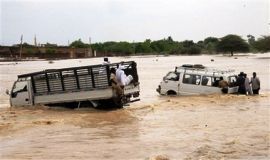Sudan floods kill 60 people, displace tens of thousands
July 31, 2007 (KHARTOUM) — Overflowing rivers and houses collapsing because of heavy rains have killed over 60 people across Sudan this month, a senior Sudanese official said Tuesday as residents in the capital stacked sand bags along the Nile’s embankments to avert more flooding.
 “Sixty-two people were killed as a result of the floods and rains,” General Awad Allah Widaa told The Associated Press. The head of the Emergency Commission for the Alleviation of the Effects of Floods and Rains said 145 people had also been injured since the unusually strong seasonal downpours began in June, and tens of thousands of cattle lost.
“Sixty-two people were killed as a result of the floods and rains,” General Awad Allah Widaa told The Associated Press. The head of the Emergency Commission for the Alleviation of the Effects of Floods and Rains said 145 people had also been injured since the unusually strong seasonal downpours began in June, and tens of thousands of cattle lost.
He said the homes of over 40,000 families are affected in northern Sudan alone. Most of the north is usually semi-desertic, and many houses here are constructed in local materials that can’t resist overly strong rains. More than 23,000 mudbrick houses have collapsed, Widaa said, and at least 140 public buildings including schools and hospitals are heavily damaged. Major roads have also been cut off, he said.
Tens of thousands have also been displaced by the flooding in semiautonomous southern Sudan, and top locals officials have recently declared the south a disaster zone.
“We cannot say this,” said Widaa, denying that a natural disaster had been officially declared in the south.
“The situation is now under control and the President of the republic has issued orders that all resources be put at our disposal,” he said.
The rains have caused mudslides that ravaged 10,000 homes on the outskirts of the capital, Khartoum, where the White and Blue Niles meet to form Africa’s largest river.
Authorities in Khartoum are spraying insecticides in the capital to avert the risk of epidemic diseases carried by mosquitoes and flies that come with the floods.
The price of products such as mosquito nets has more than doubled here in recent days as residents fear a malaria outbreak, and people in neighborhood close to the Nile have stacked sacks of sand along the embankments.
(AP)
